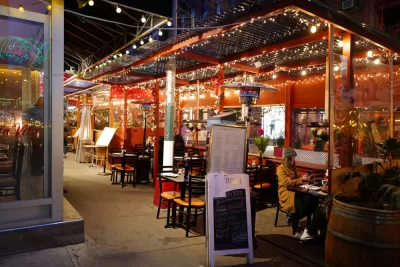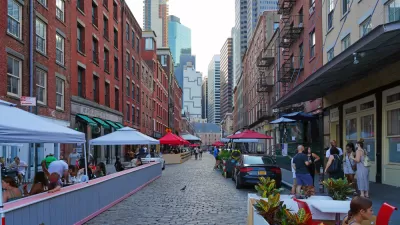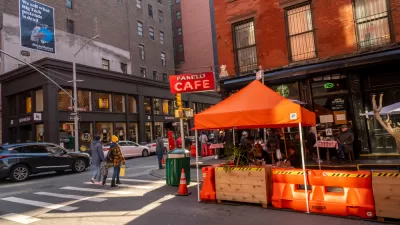A proposal to shift responsibility away from the Department of Transportation has met staunch resistance from industry groups and advocates of the program.

Writing in Streetsblog NYC, Kevin Duggan reports on the uncertain future of New York City’s outdoor dining program, which has been administered by the city’s Department of Transportation (DOT) since its inception in the early days of the Covid-19 pandemic. Since then, the program became ten times bigger than a prior sidewalk dining program managed by the Department of Consumer and Worker Protection (DCWP) and, according to some, propped up the industry during the pandemic.
The 0.3-percent reduction in private car storage for Open Restaurants saved some 100,000 jobs during the coronavirus crisis, city officials estimate, and it is still driving Gotham’s slow comeback by helping restaurants make up for pandemic losses, according to the executive director of the New York City Hospitality Alliance, which represents tens of thousands of restaurants.
A bill proposed in February would shift management of the program to the DCWP and bar restaurants from erecting outdoor dining structures in the winter months, “a non-starter, restaurateurs previously told Streetsblog because of the cost to build, dismantle and store sheds every year simply because of a winter ban.” Duggan notes that Streetsblog and restaurant industry groups have unsuccessfully tried to get answers from the bill’s sponsor, Council Member Marjorie Velázquez (D–Bronx).
Opponents of the proposal say it would “essentially kill” the outdoor dining program, and that “The $1.4-billion DOT is far better equipped to handle the mammoth initiative than the $70-million DCWP.” Restaurant owners say DOT has been a more collaborative partner, with one owner saying, “I think that [DOT] have their priorities right,” unlike DCWP, who are perceived as “punishers” rather than partners.
FULL STORY: Mayor Adams: Keep DOT in Charge of Open Restaurants

Planetizen Federal Action Tracker
A weekly monitor of how Trump’s orders and actions are impacting planners and planning in America.

Congressman Proposes Bill to Rename DC Metro “Trump Train”
The Make Autorail Great Again Act would withhold federal funding to the system until the Washington Metropolitan Area Transit Authority (WMATA), rebrands as the Washington Metropolitan Authority for Greater Access (WMAGA).

The Simple Legislative Tool Transforming Vacant Downtowns
In California, Michigan and Georgia, an easy win is bringing dollars — and delight — back to city centers.

The States Losing Rural Delivery Rooms at an Alarming Pace
In some states, as few as 9% of rural hospitals still deliver babies. As a result, rising pre-term births, no adequate pre-term care and "harrowing" close calls are a growing reality.

The Small South Asian Republic Going all in on EVs
Thanks to one simple policy change less than five years ago, 65% of new cars in this Himalayan country are now electric.

DC Backpedals on Bike Lane Protection, Swaps Barriers for Paint
Citing aesthetic concerns, the city is removing the concrete barriers and flexposts that once separated Arizona Avenue cyclists from motor vehicles.
Urban Design for Planners 1: Software Tools
This six-course series explores essential urban design concepts using open source software and equips planners with the tools they need to participate fully in the urban design process.
Planning for Universal Design
Learn the tools for implementing Universal Design in planning regulations.
Smith Gee Studio
City of Charlotte
City of Camden Redevelopment Agency
City of Astoria
Transportation Research & Education Center (TREC) at Portland State University
US High Speed Rail Association
City of Camden Redevelopment Agency
Municipality of Princeton (NJ)




























